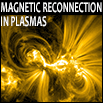Speaker
Dr
Daniel Kagan
(Tel Aviv University)
Description
We investigate the beaming of particles and the resulting synchrotron radiation in
relativistic reconnection with background magnetizations of 4, 40, and 400 via 2D
particle-in-cell simulations. First, we verify that the overall rate of energy
conversion and the characteristics of radiation are similar at all magnetizations
even for configurations including low-density background plasmas, despite the
differences in reconnection physics for such plasmas found by Bessho and
Bhattacharjee (2012). We then find that particles are accelerated to high energies in
all simulations, but bulk outflows are only mildly relativistic with Lorentz factors
~ 3 that are insensitive to magnetization, and that the overall particle momentum and
synchrotron radiation is not strongly beamed. High-energy particles in
reconnection regions are beamed within an opening angle of 1/gamma, where
gamma is their Lorentz factor, but the direction of that beaming changes with
location from the direction of the electric field to the direction of outflow as one
moves from the center of the X-point towards the magnetic island. Because the
magnetic field in the center of the reconnection region is low, the high-energy
radiation from reconnection is therefore oriented in two wide fans in the plane of
the current sheet that are centered approximately in the directions of reconnection
outflows.
Primary author
Dr
Daniel Kagan
(Tel Aviv University)
Co-authors
Prof.
Ehud Nakar
(Tel Aviv University)
Prof.
Tsvi Piran
(Hebrew University of Jerusalem)

